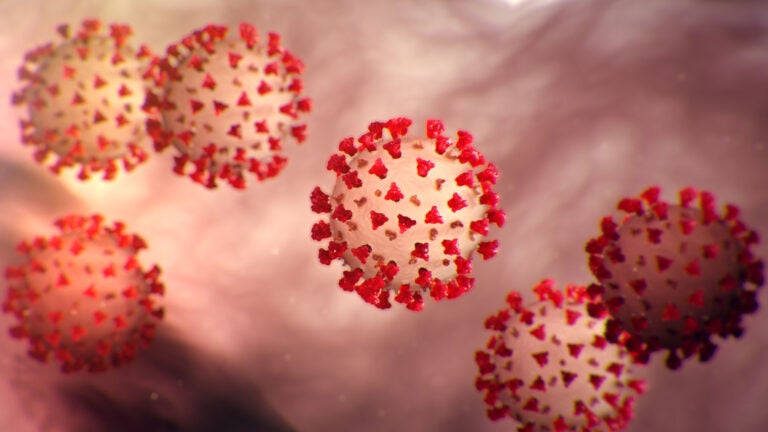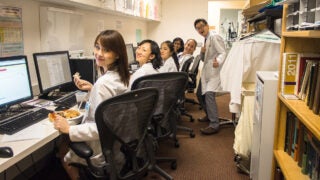
SARS-CoV-2, the virus that causes COVID-19 (Illustration/Centers for Disease Control and Prevention)
Coping with COVID: Thanks to omicron, 2022 is off to a painful start
Disruption fatigue, emotional exhaustion and skepticism about public health information are making a bad thing worse, USC experts note. Coping skills and safety measures are critical.
Disruption fatigue, emotional exhaustion and skepticism about public health information are making a bad thing worse. A COVID variant spreading faster than its predecessors is creating a sense of inevitability, making coping skills and safety measures critical as the pandemic’s third year begins
School restarts, travel plans and business operations have been thrown into park and then reverse as hospitalizations and infections match and exceed last year’s levels. Resignation is spreading as fast as omicron as people adjust to the idea that COVID is never going away.
It’s apparent how the situation is affecting the wellbeing and mental health of families.
Morgan Polikoff, USC Rossier School of Education
“It’s completely blown up again and it’s apparent how the situation is affecting the wellbeing and mental health of families,” said Morgan Polikoff, an associate professor at the USC Rossier School of Education who studies the impact of COVID-19 on American families.
Most K-12 public schools in the Los Angeles area have reopened their classrooms after the winter break, well aware that positive COVID cases will inevitably force them to quarantine some children at home while others at low-risk continue going to school.
Despite many parents’ fear that their kids may bring home the virus, Polikoff believes any real classroom is better than Zoom for student learning and wellbeing.
“We want kids physically in school, the maximum number of days possible, because in-school learning is just better than online learning” he said. “We have ample evidence of that, whether that means kids get a regular experience that day, or whether half the teachers or kids aren’t there.”
Coping with COVID: Mental wellbeing is fragile
As the lockdown approaches its second anniversary, parents, teachers and kids are all running out of what psychiatry professor Steven Siegel at the Keck School of Medicine of USC calls “emotional elasticity.”
“When that’s pushed too far, you snap,” Siegel said. “We’re living fully stretched.”
To assist a fatigued population beaten down by a COVID wave that won’t end, Siegel — who chairs the medical school’s Department of Psychiatry — recommends a strong dose of forgiveness.
“Give people grace to understand that whatever just set them off wouldn’t have set them off two years ago,” he said. “When they are irritable, when they’re intolerant, when they seem to not be bringing their full game to work, what they’re telling you is they’ve had enough. It’s a plea for grace.”
Encouraging signs during a troubled time
While omicron drags down morale and exacerbates staffing shortages at medical facilities, there’s reason for optimism based on the variant’s track record overseas. There, it spiked before rapidly receding. Scientists have learned omicron spreads faster but tends to be less severe, especially in vaccinated individuals.
Masking, social distancing and testing are still the best weapons to prevent infection, and vaccination can go a long way to at least minimize symptoms, USC medical experts note. However, that message has not anchored with about 15% of all Americans, according to the Centers for Disease Control and Prevention.
The hurdles to herd immunity include doubt, distrust and conspiracies.
A December online household survey of 61,000 Americans by the U.S. Census Bureau revealed that among those who are reluctant to get vaccinated, about half cite concerns about side effects. In the federal survey, 42% responded that they don’t trust the vaccine.
We must do a better job of educating the public regarding science, scientific methods and basic scientific principles.
Jeffrey Klausner, Keck School of Medicine of USC
“We must do a better job of educating the public regarding science, scientific methods and basic scientific principles,” said Jeffrey Klausner, clinical professor at the Keck School of Medicine of USC.
Klausner, who speaks regularly about COVID information and misinformation in media, has called on faith leaders, sports stars and musicians to restore faith and bridge the political divide. He’s distressed by the lack of knowledge and eroding faith in health expertise.
“People know the rules of football better than how their own immune systems work,” he said. “The pandemic is a wake-up call.”
Communicating truth to save lives: Coping with COVID
Science denial, although frustrating for scientists and those trying to save lives, is not impossible to overcome, although it certainly is challenging – as researchers focused on climate change well know..
In their article for The Conversation, USC Rossier psychologist Gale Sinatra and her co-author — Barbara Hofer, professor emerita of psychology at Vermont’s Middlebury College — noted that people can take several steps to confront science denial. “Individuals can check their own motivations and beliefs about climate change and remain open minded to scientific evidence,” they wrote. “Educators can teach students how to source scientific information and evaluate it.”
“Science communicators can explain not just what scientists know but how they know it,” they advised, and “policymakers can make decisions based on scientific evidence.”
Lastly, they observed that many people tend to stick with news sources within an identity group. Sources can include a local newspaper source in their area or a news source that is affiliated, for example, with their political party preference.
A varied media diet is the best way to make informed decisions about complex problems.
“Break out of your social bubble and listen to and talk with others. Look up,” Sinatra and Hofer wrote.



